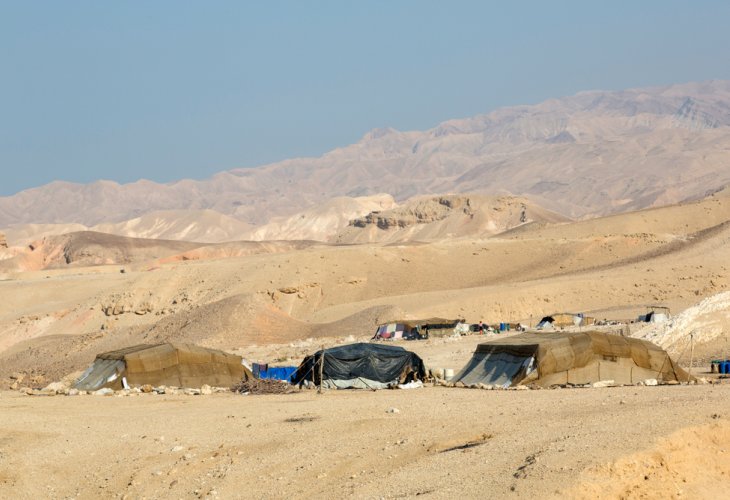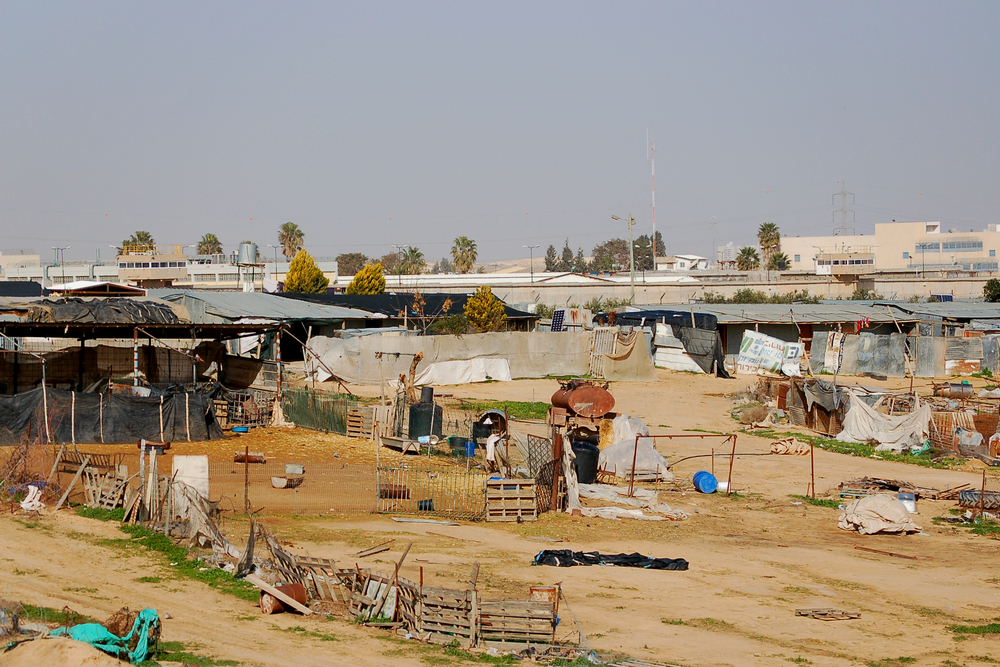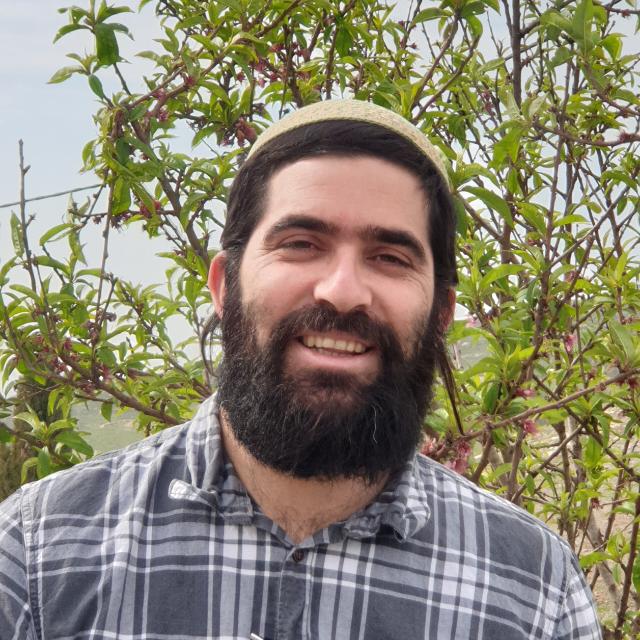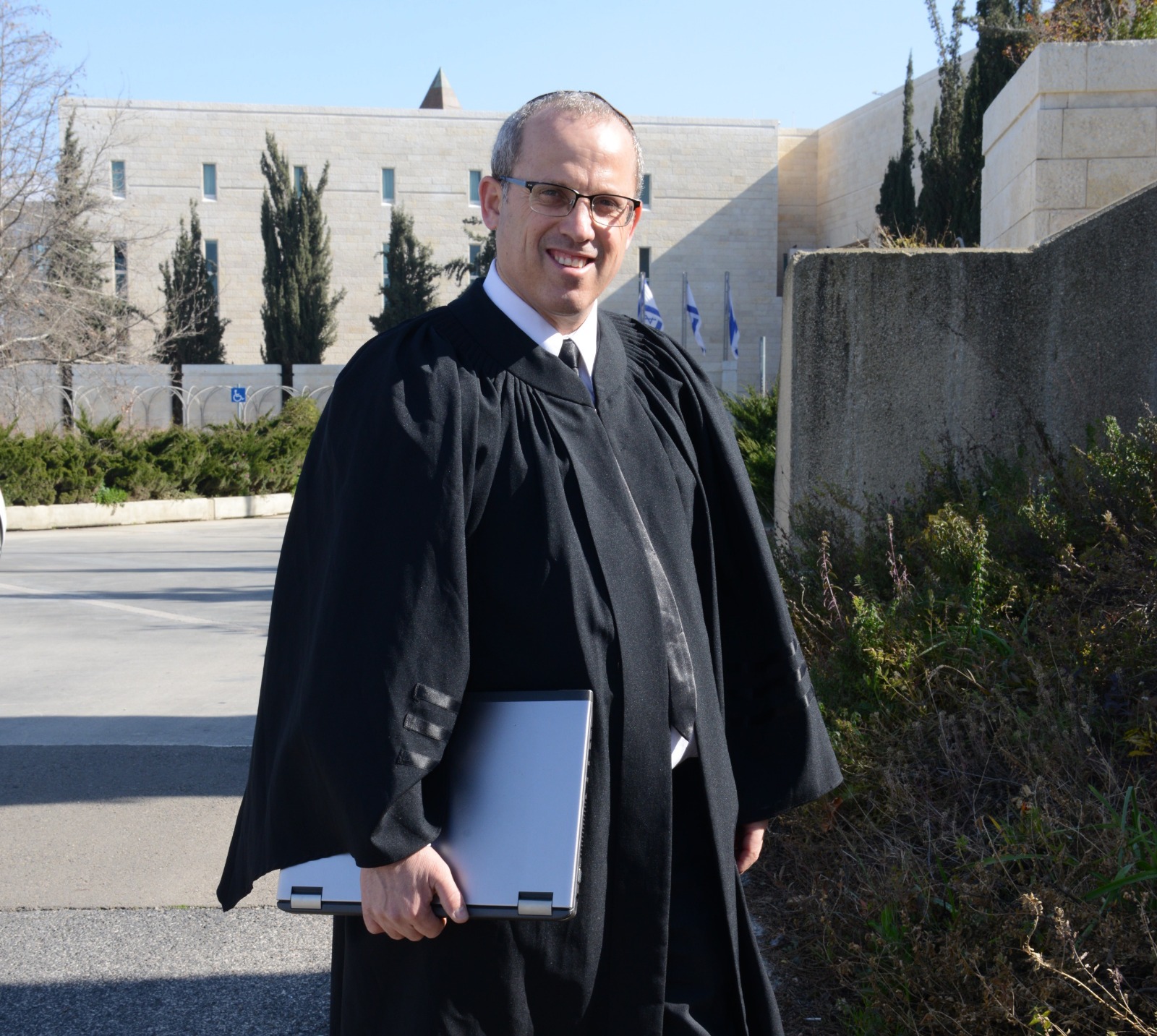Are the Bedouins Taking Over the Negev? A Fiery Interview with 'Regavim' Spokesman
Riding fast on ATVs, the Bedouin looters break into the large IDF base in the Negev, Tze'elim. They encounter no significant security or deterrence by the judiciary system, turning weapon theft from IDF bases into a widespread phenomenon.
 (Photo illustration: shutterstock)
(Photo illustration: shutterstock)It happened recently. A group of Bedouins from the Bedouin diaspora in the Negev reached the large IDF base at Tze’elim. The unsecured base was an easy target for the Bedouin looters. They broke into the place without any problem, leaving shortly after with military spoils.
"Unfortunately, this is an event that happens periodically," says Avraham Binyamin, spokesman for the 'Regavim' movement, aimed at fighting for Israeli sovereignty in the Negev, which is eroded due to Israel's inaction against the vandalism and illegal encroachment by the Bedouins in the Negev. "Overall, there's a wave of weapons thefts from the major base in the Negev," he notes. But this event was different from previous ones due to the soldiers' reaction. An officer present decided to start a rare chase after the perpetrators, who fled to one of the nearby Bedouin settlements, where other looters awaited, forcing the Israeli soldiers to leave, with one soldier having to fire into the air for safety.
"This story could have ended differently," says Binyamin, who has been following events in the Negev for 7 years. "The situation on the ground is particularly problematic, with the Bedouins de facto controlling large parts of the Negev, without Israel demonstrating sovereignty. Bedouin control manifests in unregulated construction and a lack of enforcement by the authorities, as well as in the wild behavior of some on the southern roads, which continues despite documentation of Bedouin rioting on Israeli roads failing to address the issue.
 (Photo illustration: shutterstock)
(Photo illustration: shutterstock)Another problematic aspect in the region is the protection racket phenomenon prevalent in the Negev. "Sometimes it seems like the State of Israel has given up on the area," says Binyamin.
What policy do you propose to eradicate the phenomenon of IDF weapon thefts?
"Shortly after the soldiers' chase after the Bedouins, the army instructed soldiers not to pursue Bedouin thieves further but to involve the police in such cases," says Avraham. "This order does not strengthen Israeli sovereignty in the area; it weakens it further. Israel cannot allow these dangerous weapon thefts, ongoing for 15 years, to continue. Therefore, combating Bedouin thefts should involve increasing security at the base, allocating forces to catch the thieves, and a critical additional solution involving harsher penalties for the thieves.
"We propose imposing much harsher penalties on the thieves, and fining them heavily. But currently, the judicial system is slow to harshly judge these criminals, resulting in the situation in the Negev reflecting the verse in Judges: 'In those days, men did whatever was right in their own eyes'.
The judiciary treats us differently because we are right-wing
"Just as bus drivers, dentists, and grocery clerks have political views, so do Israeli judges have clear political positions, yet the judiciary and parts of the media ignore this, presenting judges as members above reproach, not participating in Israel’s political processes, which harms the court's credibility," accuses Regavim's spokesman at the start of the conversation.
The interview occurs against the backdrop of the Israeli judiciary's increasing involvement in decisions and laws passed by the Knesset and the political system. This involvement reached the headlines again with Prime Minister Netanyahu’s trial commencing about a month ago. It highlighted that the true rulers of Israel are the judges, not the people. Though Netanyahu arrived in court due to legal circumstances, not constitutional ones, the trial sent a clear message: the sovereigns of Israel are the judges, not the lawmakers. Some recalled Netanyahu's previous court visit, defending a gas reform he led, underscoring the troubling change that the "justice system" in Israel underwent, from a judicial entity to Israel's ultimate legislator.
Since the judicial revolution declared by Aharon Barak, the Supreme Court has become the strongest entity in Israel, stronger than the Knesset members, coalition, Prime Minister, or President. Post-revolution, the Supreme Court judges became the masters of the land; annulling laws as they see fit, under ostensibly value-based "reasonableness" justifications and obliging various organizations to adopt the judges' personal worldview.
However, it was evident that alongside all these reasons, the court clearly favors left-wing principles over right-wing ones. The ones who revealed the judges’ disgrace to all were not government ministers, Knesset members, or senior officials on governmental committees but a brave and active movement, operating without government backing, which published a structured report exposing how the court discriminates against right-wing organizations compared to left-wing ones, without any legal justice. The movement revealing this truth is the Regavim movement.
What led you, as a movement dealing with land encroachment in the Negev, to trace the judiciary’s treatment of the right?
"Over the years, reality forced us to fight in courts against Bedouin and Arab intruders who seized lands not belonging to them. In many such cases, we left court feeling differently treated than groups and organizations associated with the political left. At some point, we decided to check this gut feeling, not unique to us but well-known in the right-wing community, with a structured report examining the judiciary’s conduct, and the findings were unequivocal," he notes.
Avraham Binyamin clarifies that the Regavim movement was extremely careful in compiling the report, aiming for a clear conclusion without ambiguity. "To that end, we conducted a comparative study, covering deliberations held in the courts over several years. The report examined petitions submitted by both the left and right of the political spectrum. After collecting similar lawsuits, we examined the judges' conduct towards claims from both political sides, even before hearing the deliberations and presenting the full picture in court, so that one could not claim judges handle the different claims differently due to differences between them, as this stage precedes data presentation to the judges. Findings showed that the Israeli court is clearly biased towards the left."
 Avraham Binyamin (Credit: Regavim)
Avraham Binyamin (Credit: Regavim)How did you discover the bias towards the left if you did not consider the deliberations themselves and judges’ rulings?
"It turns out that even before verdicts and hearings, one can see the judges' relation to the case and assess whether they take the petition seriously or attribute to it lesser importance, and we tested this technical aspect."
In the Regavim study, petitions from both political sides were collected, examining how quickly a discussion date was set; whether promptly, indicating the court’s regard for the petition, or if the court defers to a relatively later date, implying lesser court regard. Additionally, whether the court requires the state to respond quickly to the petition, or if the judicial system allows the state to buy time. Another reviewed issue is whether the court grants an injunction limiting land activities during litigation or waives such despite the land’s ownership being under discussion.
Report data points to a deep-rooted problem in the judicial system’s operation. "Numbers prove clear discrepancies against right-wing petitioners," says Binyamin. "In one such case, we represented Haredi developers whose purchased land was seized by Bedouins, who now seek to reclaim the land they wholly acquired. In court, we demanded the judges compel the Bedouins to vacate within a set timeframe, as they ordered the state in Migron and Netiv HaAvot, where Arabs claimed land ownership where Jews resided. But the court amazingly evaded it, claiming the cases were not identical. It was one of the latest cases illustrating the court’s different treatment of Jews compared to Arabs."
What indeed accounts for the court’s blatant discrimination against Jewish claims versus similar Arab claims?
Attorney Boaz Arazi, who files lawsuits on behalf of Regavim, suggests it is actually latent racism against Arabs. "Regrettably," he states, "often our state mismanages situations, and I believe it involves latent racism, with judges showing in their rulings that expectations from Arab citizens are lower compared to similar expectations from Jews. This allows Arabs to act against law and ethics."
Conversely, Avraham Binyamin attributes it to judges’ worldviews. "As said earlier, judges are human with political positions. Many hold radical left-wing views. The court is split between conservative and activist judges; the former identified more with the right, and the latter with the left. Activist judges dominate the court, unfortunately, leading to the current rulings," he says.
The Arab Plan for Area C Land Seizure
"The Regavim movement primarily involves legal land redemption in Israel," says Arazi. "Palestinians aim to set facts on the ground in Area C, against which we fight," he asserts. According to him, "The Palestinians' goal is to complicate future Israeli construction in Area C with Jewish settlements, while these areas are currently under official Israeli control." Boaz Arazi points out the problematic reality where most residents in Area C are Jews, yet Arabs control the majority land. "Thus, the Palestinian ideology has materialized in practice on the ground," he clarifies.
 Attorney Boaz Arazi (Credit: Regavim)
Attorney Boaz Arazi (Credit: Regavim)Arazi indicates that "the Palestinian Authority operates a precise 'roots program' with a special minister for Area C. They outmaneuver us, acting sophisticatedly, presenting a façade of official land ownership through illegal entry and cultivation, seemingly private ancestral land."
The problematic data you present raises why Israel doesn’t enforce ground regulations?
"Many decision-makers in Israel do not fully believe in our righteous path and claim to the land. Among Israeli decision-makers, an abiding belief exists that the land does indeed belong to the Palestinians, leading them to think Palestinians have the right to seize the land.
"Another reason for Israel's inactivity against these lawbreakers," he states, "is the fear of confrontations. There are, as known, thousands of illegal land seizures across the Negev, and authorities avoid action, fearing confrontation with the Bedouins. The other side has noticed Israel’s predicament, ensuring any such eviction turns violent, similar to what happened at Umm al-Hiran, where police tasked with evacuating an illegal outpost had to fatally shoot a driver fearing he intended to carry out a ramming attack."
This reality, he argues, undermines law enforcement in the region and leads to the state repeatedly conceding to give the Bedouins better terms to vacate. "These terms are dreams for any other Israeli citizen. For example, the state agrees to grant every child aged 18 ownership of their plot to persuade the Bedouins to leave the land. To such extent," he says and adds, "consider that it involves 60,000 people spread over a vast area of 750,000 dunams!"
In conclusion, what can be done to change the judicial leaning leftward?
"Several ways exist to manage the judicial issue," says Avraham Binyamin. "Currently, there is no balance between the three branches of government: legislative, judicial, and executive. As of now, the judiciary is almost unchecked, and post-judicial revolution, it also becomes Israel's supreme legislator, instead of legislation being the preserve of Knesset members. Above all, there's the flawed system of judicial selection, known for the 'friend brings a friend' method without appropriate oversight. It’s easy to see the fundamental anti-democratic nature of this situation," explain at Regavim.
Instead, the organization suggests several ways to change the judicial system’s operation. "The first method is to legislate the override clause," says Binyamin. "Such legislation would mean the court cannot overturn a law passed by a 'supermajority' of 72 Knesset members, for instance. Another measure to constrain Supreme Court power is to challenge judge selection methods, ensuring judges are chosen by lawmakers with their views known to all when selected, just like in the US, where politicians choose judges based on political views."

